98 episodes


Today’s First Person story comes from Fatma Jaffar, a Yemeni humanitarian worker and the policy and advocacy lead for Oxfam Yemen. Fatma describes the dire humanitarian situation in her country and how Yemenis have kept each other alive throughout nine years of war. The ongoing conflict in Yemen is featured in The New Humanitarian’s annual list of ten crises that demand your attention now, which highlights places in the world where needs are rising, aid budgets are cut or insufficient, and where people feel forgotten by the international community. Over the coming months, our First Person series will feature aid workers and people affected by the crises on this year’s list. On the nine-year anniversary of the war in Yemen, The New Humanitarian also launched The Yemen Listening Project, which highlights stories from more than 100 Yemenis answering one question: “How has the war impacted your life? The New Humanitarian aims to amplify the voices of refugees, asylum seekers, and people affected by conflict and disaster - placing them at the centre of the conversations about the policies and events that shape their lives. Find more first-person stories at TheNewHumanitarian.org


As Yemen’s war continues, a new project by The New Humanitarian shares personal testimonies that show how the devastating conflict has changed life for millions, while the rest of the world wasn’t paying attention. And how important it is that we keep listening. Nuha al-Junaid, project coordinator for the The Yemen Listening Project, tells her own story of war and migration with guest host and Middle East Editor, Annie Slemrod. What’s Unsaid is a bi-weekly podcast by The New Humanitarian where we explore open secrets and uncomfortable conversations around the world’s conflicts and disasters.


For nearly 40 episodes, Rethinking Humanitarianism has been hosted by Heba Aly. But this time around, Aly joins the podcast as a guest. Since 2007, Aly has worked with The New Humanitarian, and IRIN News before, in many different roles. It’s a journey she started as an intern, and recently finished as the CEO. In this season finale, Aly joins host Melissa Fundira to reflect on her career and the evolution of humanitarian journalism, how the humanitarian sector has (or hasn’t) changed, and which episode is inspiring her next move. She also fields questions from colleagues and podcast guests. Guest: HEBA ALY, former CEO of The New Humanitarian ____ Got a question or feedback? Email podcast@thenewhumanitarian.org or have your say on Twitter using the hashtag #RethinkingHumanitarianism. ____ SHOW NOTES __ __ SOME OF HEBA’S FAVOURITE RETHINKING HUMANITARIANISM EPISODES __ __


A project to turn Kenya's refugee camps - some of the largest in the world - into self-reliant communities where refugees can live, work, and set up businesses among their local hosts was recently launched. Host Obi Anyadike asks Victor Nyamori, a researcher and adviser for Refugee and Migrants’ Rights at Amnesty International, what he thinks of this idea, dubbed the Shirika Plan. Given his work on legal protection for Kenya’s refugees in Dadaab and Kakuma refugee camps, is he optimistic that it will improve their lives? What’s Unsaid is a bi-weekly podcast by The New Humanitarian where we explore open secrets and uncomfortable conversations around the world’s conflicts and disasters.


A Mercy Corps staff member describes life in the sliver of southern Gaza where 1.2 million people are sheltering in desperate conditions. The author’s name is being withheld for safety given the security situation in Gaza. Their First Person essay is read out by The New Humanitarian's Freddie Boswell. This essay was written before Prime Minister Benjamin Netanyahu ordered the Israeli military to prepare plans for a ground invasion of Rafah and for the ‘evacuation’ of the population from the area. With nowhere left for people to flee in Gaza, there is growing international alarm about the humanitarian impact of an assault. The New Humanitarian aims to amplify the voices of refugees, asylum seekers, and people affected by conflict and disaster - placing them at the centre of the conversations about the policies and events that shape their lives. Find more first-person stories at TheNewHumanitarian.org


Medical missions are a lifeline to stressed health systems, usually in developing and post colonial states, but they can also be caught up in, and manipulated by, the politics of the powerful. Host Ali Latifi asks Dr. Zaher Sahloul, president and co-founder of MedGlobal, a medical NGO, whether dismissal over medical neutrality is getting worse. What’s Unsaid is a bi-weekly podcast by The New Humanitarian, where we explore open secrets and uncomfortable conversations around the world’s conflicts and disasters.


They say two things in life are certain: death and taxes. But taxes – and how they’re collected – are anything but certain, and certainly not fair. Every year, nearly $500 billion in tax is lost to corporate and individual tax abuse, enough to vaccinate the world against COVID-19 three times over, or provide basic sanitation to 34 million people. Another $5 trillion is projected to be lost in the next 10 years as multinational corporations and the ultra-wealthy use tax havens to underpay taxes. But the international tax justice movement is picking up steam, buoyed by a recent vote at the UN General Assembly to start negotiations on an international tax treaty. The move, spearheaded by The Africa Group and largely opposed by the OECD, which groups some of the world’s wealthiest countries, has been described as “the biggest shake-up in history to the global tax system”. What are the implications for humanitarians? And what could it mean for aid-dependent countries to recoup trillions of dollars in lost tax revenue? Co-hosts Heba Aly and Melissa Fundira also share listener reflections from the podcast’s last episode on Westerners stepping aside from top positions in favour of historically marginalised leaders. They also share a long-awaited statement from the International Council of Voluntary Agencies (ICVA), the NGO network whose executive director spoke openly about wanting to be replaced by a non-male, non-Western candidate, only to be succeeded by another white man. Guests: HASSAN DAMLUJI, co-founder of Global Nation; ALVIN MOSIOMA, associate director of climate, finance, and equity at Open Society Foundations ____ Got a question or feedback? Email podcast@thenewhumanitarian.org or have your say on Twitter using the hashtag #RethinkingHumanitarianism. ____ SHOW NOTES __ __


When danger comes, foreign aid workers are often flown out, leaving behind local staff to risk their lives. Othman Moqbel is the CEO for Action for Humanity, an international aid agency trying to provide protection equally to all staff. What’s Unsaid is a bi-weekly podcast by The New Humanitarian where we explore open secrets and uncomfortable conversations around the world’s conflicts and disasters.


Crises are mounting, and their impacts are overlapping and rippling across the globe. Emergency response has grown more complicated, and more costly. What’s the way forward? Each year, The New Humanitarian publishes our list of trends driving humanitarian needs and shaping crisis response. From military sieges and water scarcity to ‘deterrence’ migration policies and governments’ refusal to deal with ‘pariah’ states, we unpack some of the key factors that will see an estimated 300 million people need emergency aid this year. On 31 January, we brought together a range of voices from across the humanitarian sector to discuss what’s driving crises, and the next steps in addressing them. This is a recording of that discussion.
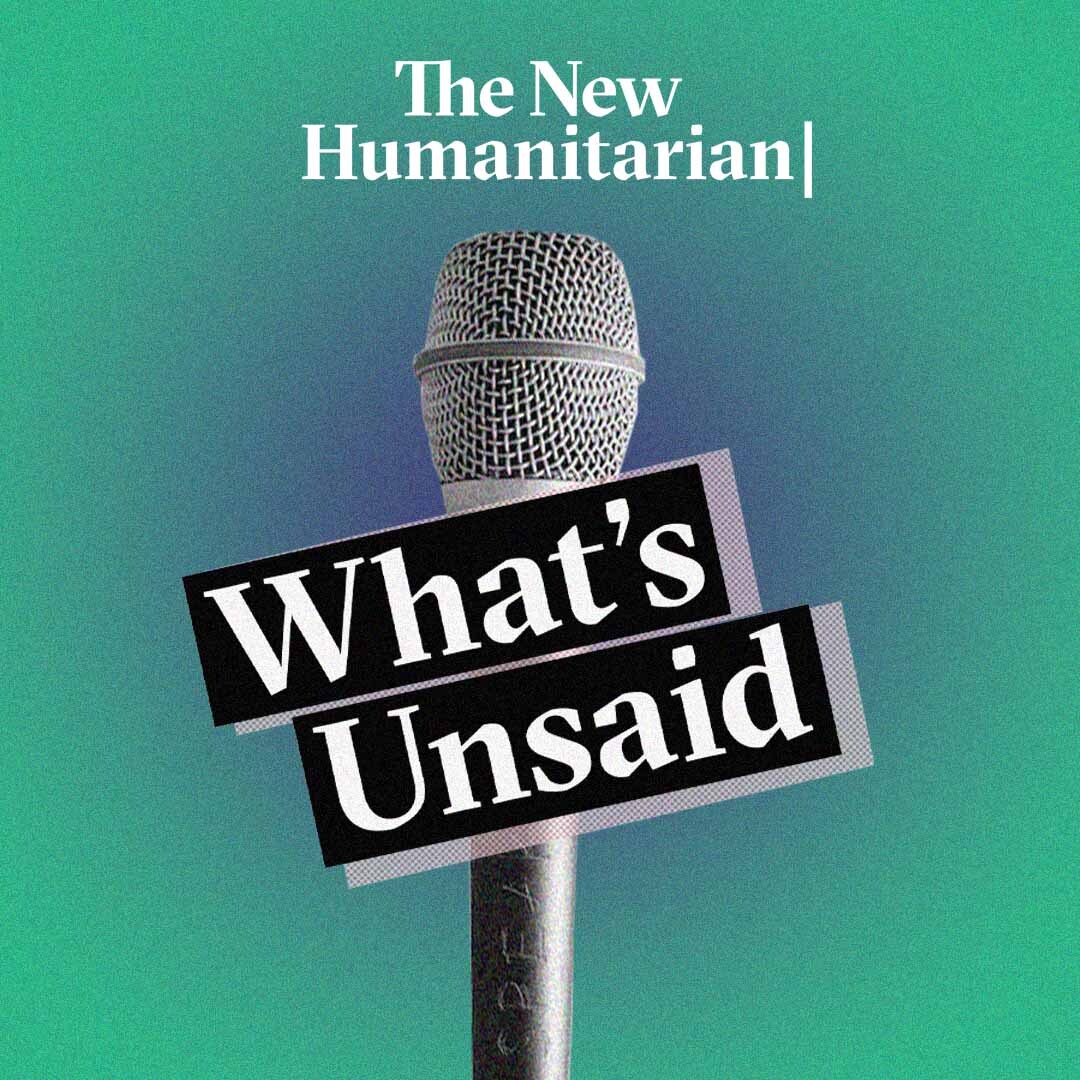

Migration policies are making borders tougher to cross and pushing people to risk their lives along ever more dangerous routes. Is there a way to stem the rising number of migrant deaths? Eric Reidy, The New Humanitarian’s migration editor, and host Ali Latifi discuss why we’re likely to continue to see a high number of deaths in 2024 and explore better policies to keep people safe. What’s Unsaid is a bi-weekly podcast by The New Humanitarian, where we explore open secrets and uncomfortable conversations around the world’s conflicts and disasters.
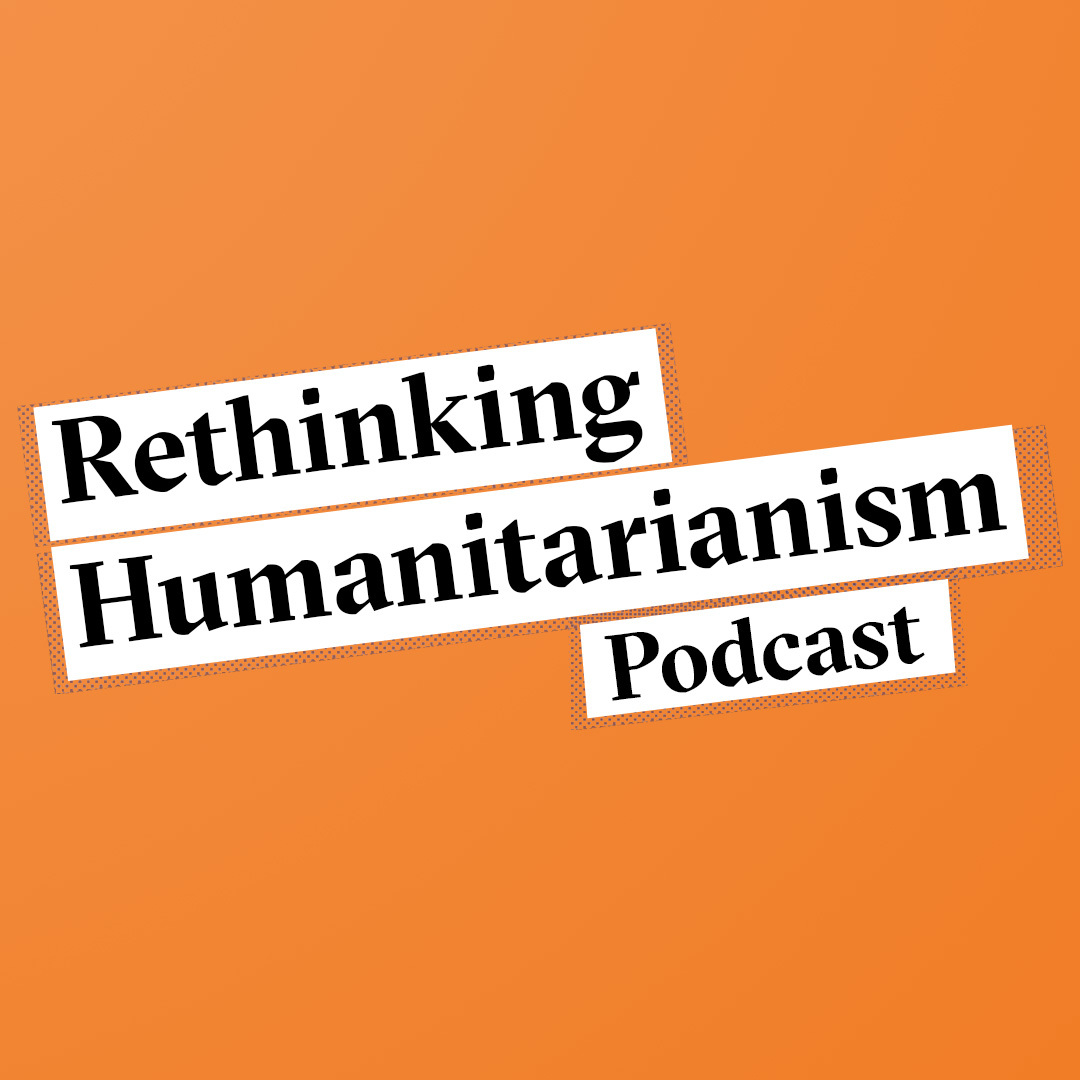

For as long as the international humanitarian sector has existed, its top jobs have been overwhelmingly occupied by white Western men. And yet, most of the people affected by their decisions come from the global majority. One, rarely exercised, tactic to address this power differential is for Western leaders to step aside or be willing to turn down coveted top positions in favour of historically marginalised leaders – especially those whose lived experience gives them a better understanding of the very issues international organisations aim to address. Co-hosts Heba Aly and Melissa Fundira are joined by two guests who voluntarily relinquished their roles in efforts to make way for more representative leadership. They reflect on the defining moments that led to their decisions, how they prepared their exits, the triumphs and disappointments that followed, and how the sector as a whole can operationalise “stepping aside” as a tactic to shift power. Guests: IGNACIO PACKER, Executive Director of the Initiatives of Change Switzerland Foundation and former Executive Director of the International Council of Voluntary Agencies (ICVA); DIANA ESSEX-LETTIERI, consultant and former Senior Vice President of Asylum Access. ____ Got a question or feedback? Email podcast@thenewhumanitarian.org or have your say on Twitter using the hashtag #RethinkingHumanitarianism. ____ SHOW NOTES __ __


*This episode was originally published on November 23, 2023. Human rights lawyer and war crimes investigator Yasmin Sooka joins host Ali Latifi in a conversation about using the word “genocide”, and why language matters – in the middle of a crisis, and in the aftermath of mass violence. What’s Unsaid is a bi-weekly podcast by The New Humanitarian, where we explore open secrets and uncomfortable conversations around the world’s conflicts and disasters.


Time and again, guests on this season of have called for systemic changes to the humanitarian system and global governance – from alternatives to the UN to revolutionised global climate financing. But how can you imagine something you’ve never seen before, while being grounded in the realities of today? In many ways, this is the domain of science fiction. The writer and activist Walidah Imarisha once said: “Any time we try to envision a different world – without poverty, prisons, capitalism, war – we are engaging in science fiction.” With science fiction, she added, we can start with the question “What do we want?” rather than the question “What is realistic?” In this first episode of the New Year, host Heba Aly looks to the future to explore how science fiction can bring about paradigmatic change by helping us believe a better world is possible. She is joined by sci-fi authors whose work speaks directly to the future of global governance and how to better address crises. Kim Stanley Robinson is the acclaimed science fiction writer behind the trilogy, and, more recently, . Malka Older is the author of and The New Humanitarian short story ————— If you’ve got thoughts on this episode, write to us or send us a voice note at podcast@thenewhumanitarian.org. SHOW NOTES __ __ BOOKS AND AUTHORS MENTIONED IN THIS EPISODE __ __


Refugees International, The New Humanitarian, and Asylum Access hosted an event on the sidelines of the Global Refugee Forum in Geneva for a candid conversation about how to truly include refugees in the policy decisions that shape their lives. SPEAKERS __ __ ____ Got a question or feedback? Email podcast@thenewhumanitarian.org or have your say on Twitter using the hashtag #RethinkingHumanitarianism. ____ SHOW NOTES __ __


From new conflicts in Gaza and Sudan, to flood disasters in Libya and East Africa, to earthquakes in Morocco, Syria, and Türkiye, humanitarian crises around the world drove more than 350 million people to need help in 2023. While funding to address those needs reached record levels, so too did the funding gap. Only a third of the $57 billion that humanitarians appealed for this year was actually received – the largest shortfall in years. For the last episode of 2023, we reflect on the year that’s been, Rethinking Humanitarianism-style. Which events have forced a rethink in aid? Have any lines been drawn in the sand? And how has 2023 been a turning point in the way aid is delivered? Co-hosts Heba Aly and Melissa Fundira convene a roundtable for a wide-ranging discussion on everything from humanitarianism’s more prominent role in the climate agenda, to shifting ideologies on neutrality and mutual aid networks, and of course funding. Guests: NAZANINE MOSHIRI, senior analyst (Climate, Environment & Conflict, Africa) at the International Crisis Group; IRWIN LOY, senior policy editor at The New Humanitarian; DUSTIN BARTER, senior research fellow at ODI’s Humanitarian Policy Group ____ Got a question or feedback? Email podcast@thenewhumanitarian.org or have your say on Twitter using the hashtag #RethinkingHumanitarianism. ____ SHOW NOTES __ __
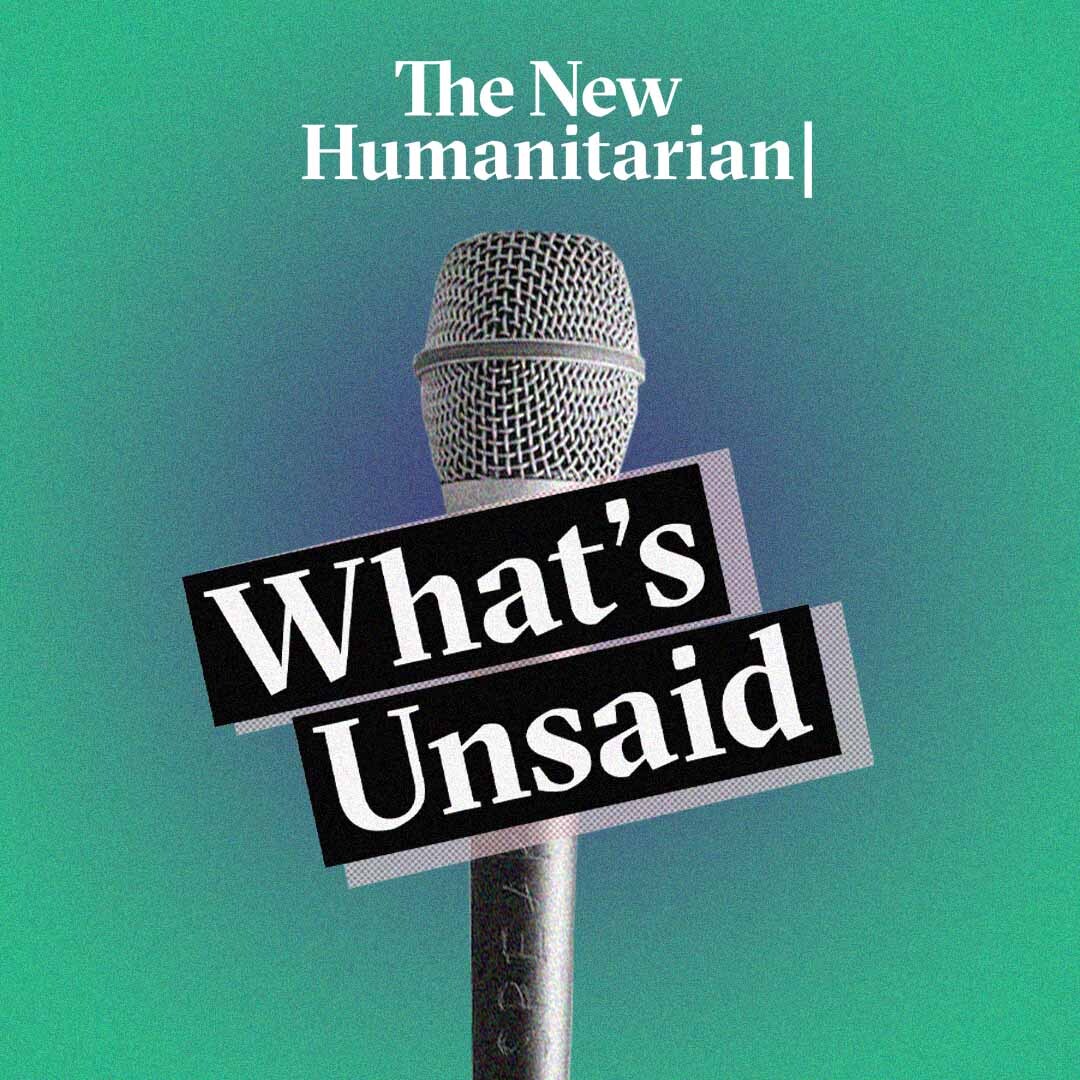

Could talking about aid diversion actually help people who need aid? Ashley Jackson is the co-director of the Center on Armed Groups and a former aid worker. She has researched aid diversion in Afghanistan, Somalia, and elsewhere, and joins host Irwin Loy for a candid conversation. What’s Unsaid is a bi-weekly podcast by The New Humanitarian, where we explore open secrets and uncomfortable conversations around the world’s conflicts and disasters.
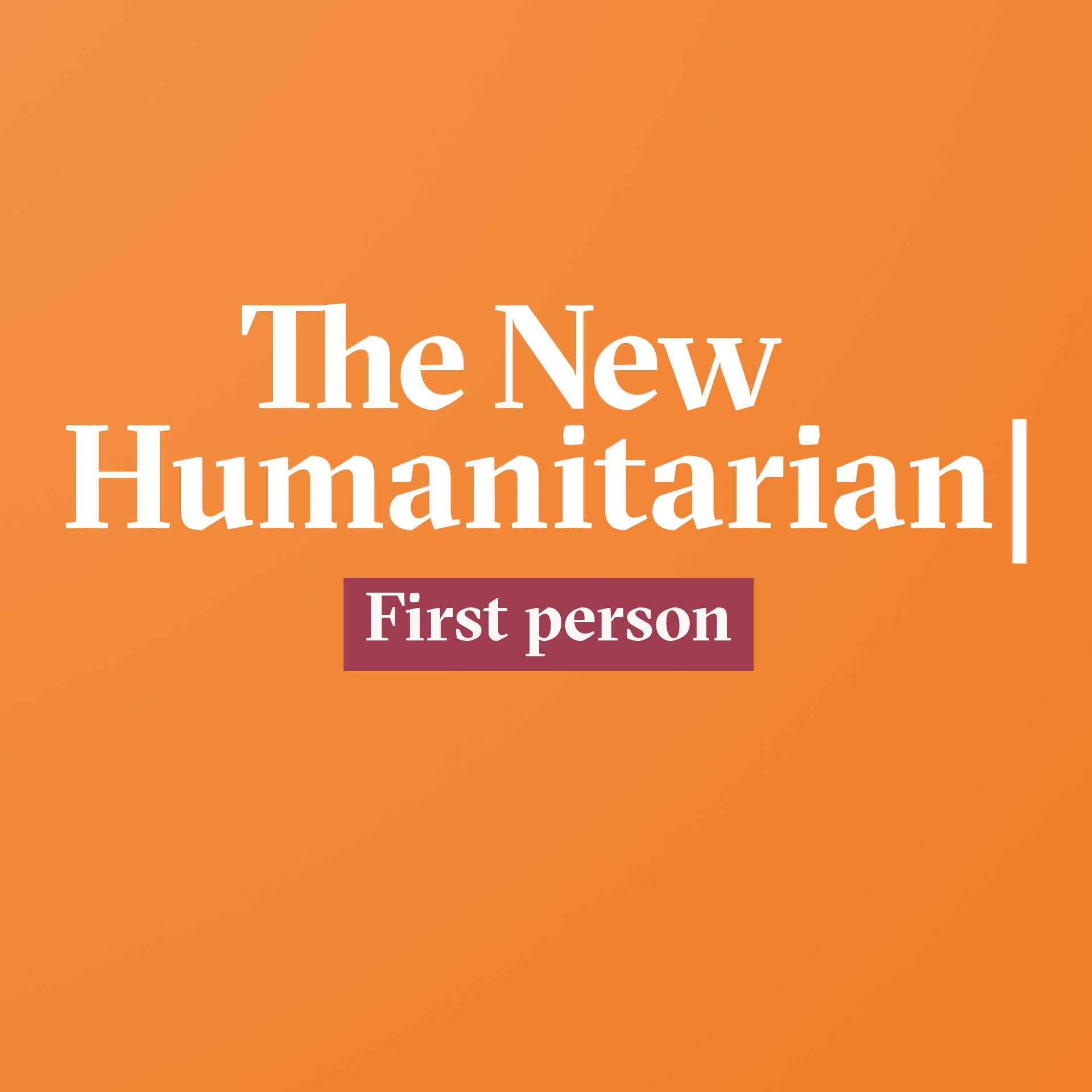

Ala Majid Khayrullhah, a medical student and climate activist, shares what he witnessed in Libya a month after the devastating floods. The New Humanitarian aims to amplify the voices of refugees, asylum seekers, and people affected by conflict and disaster - placing them at the centre of the conversations about the policies and events that shape their lives. Find more first-person stories on TheNewHumanitarian.org


Human rights lawyer and war crimes investigator Yasmin Sooka joins host Ali Latifi in a conversation about using the word “genocide”, and why language matters – in the middle of a crisis, and in the aftermath of mass violence. What’s Unsaid is a bi-weekly podcast by The New Humanitarian, where we explore open secrets and uncomfortable conversations around the world’s conflicts and disasters.


Even before Israel’s current siege, 80% of Gazans relied on international humanitarian aid for survival, according to the UN. But under international law, it’s the occupying power’s responsibility to provide food, shelter, medicine, and other essential needs. Have aid agencies historically let Israel off the hook by failing to challenge the very thing that creates the need for aid in the first place: Israel’s occupation? And if decades of humanitarian response in the region have failed Palestinians thus far, as some argue, but halting it would be catastrophic, as others say, then how should aid agencies pivot? Guests: Yara Asi, assistant professor in the School of Global Health Management and Informatics at the University of Central Florida, co-director of the Palestine Program for Health and Human Rights, US Fulbright scholar to the West Bank; Chris Gunness, former UNRWA spokesperson ____ Got a question or feedback? Email podcast@thenewhumanitarian.org or have your say on Twitter using the hashtag #RethinkingHumanitarianism. ____ SHOW NOTES __ __
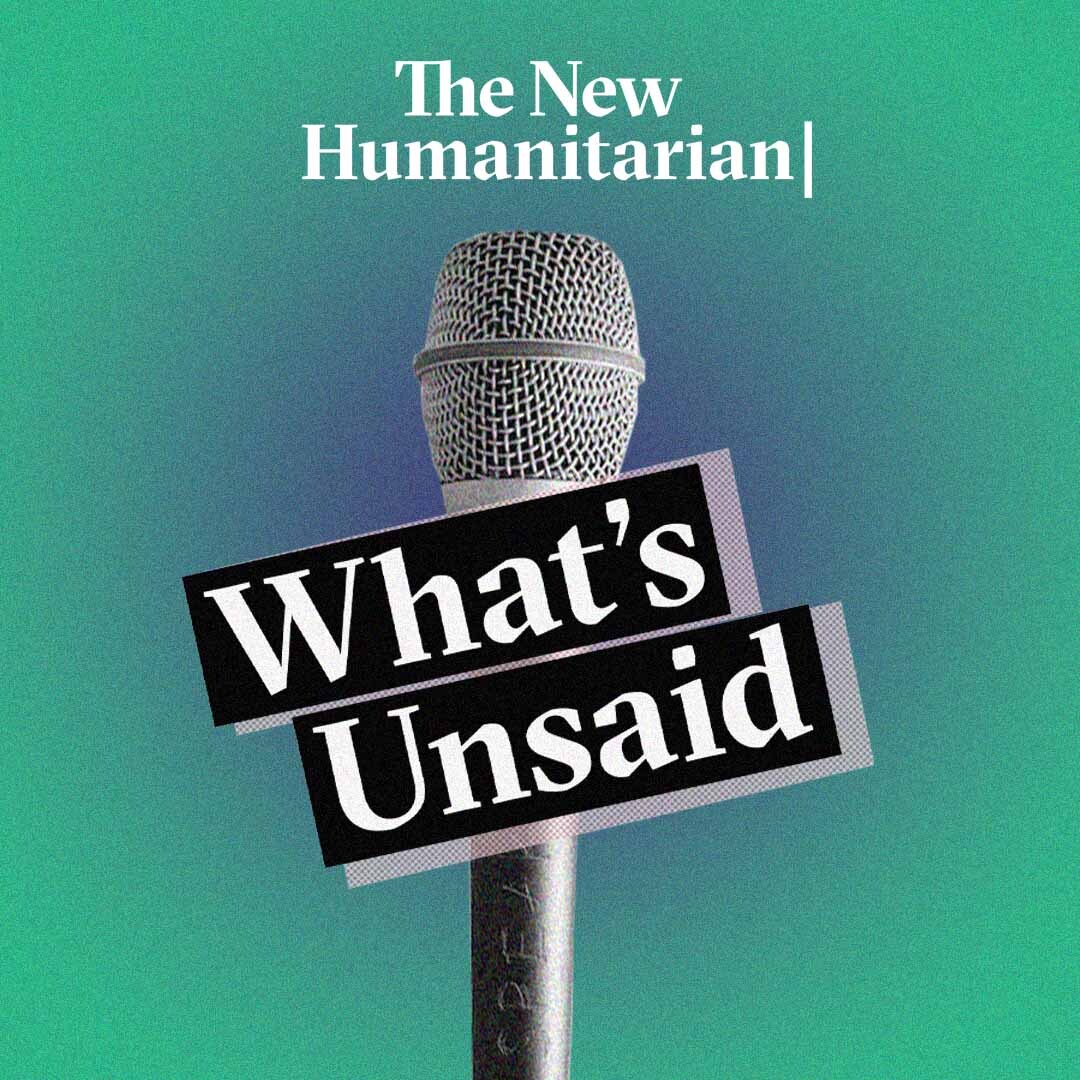

Palestinian peace activist Nivine Sandouka discusses the difficult way forward for building trust between Israelis and Palestinians. Hosted by Irwin Loy. What’s Unsaid is a bi-weekly podcast by The New Humanitarian, where we explore open secrets and uncomfortable conversations around the world’s conflicts and disasters.


An anonymous aid worker reflects on their time in Palestine as they watch Israel's bombardment and siege of Gaza and the escalating violence in the West Bank. Today's First Person essay is read out by The New Humanitarian's Elise Campbell-Bates. The New Humanitarian https://www.thenewhumanitarian.org/ aims to amplify the voices of refugees, asylum seekers, and people affected by conflict and disaster - placing them at the centre of the conversations about the policies and events that shape their lives. Find more first-person stories at TheNewHumanitarian.org


Palestinian-American writer and journalist Mariam Barghouti joins host Ali Latifi to discuss how both mainstream media and aid policy help muffle Palestinian perspectives. What’s Unsaid is a bi-weekly podcast by The New Humanitarian, where we explore open secrets and uncomfortable truths around the world’s conflicts and disasters.


It has been six months since a military conflict in Sudan began claiming thousands of lives and triggered, according to the UN, the world’s fastest growing displacement crisis. As international NGOs and the UN struggle to access certain areas, decentralised mutual aid networks – known as emergency response rooms (ERRs) – have stepped in to fill the vacuum. In acknowledgement of this reality, donors, international NGOs and UN agencies are trying to shift their programmes to support these local volunteer-led networks, but deep-seated bureaucracy – standing in stark contrast to mutual aid groups’ nimbleness and agility – has meant that only a fraction of the millions of dollars promised to them have been received by ERR volunteers. Co-hosts Heba Aly and Melissa Fundira speak to two guests about unprecedented levels of collaboration between ERRs and the international humanitarian system, how they are trying to overcome the challenges, and how mutual aid groups are spurring a broader shift of power within Sudanese society. Guests: HAJOOJ KUKA, external communications officer for the Khartoum State Emergency Response Rooms; FRANCESCO BONANOME, humanitarian affairs officer with the UN’s emergency aid coordination body, OCHA, in Sudan, focal person for the ERRs ____ Got a question or feedback? Email podcast@thenewhumanitarian.org or have your say on Twitter using the hashtag #RethinkingHumanitarianism. ____ SHOW NOTES __ __


Conflict analyst Hisham Al-Omeisy joins host Irwin Loy to explain how war has become a profitable business in Yemen, even as millions of Yemenis struggle. What’s Unsaid is a bi-weekly podcast by The New Humanitarian, where we explore open secrets and uncomfortable truths around the world’s conflicts and disasters.


What’s Unsaid is our new bi-weekly podcast exploring the open secrets and uncomfortable truths that often surround the world’s conflicts and disasters, hosted by staff editors Irwin Loy and Ali Latifi. A podcast by The New Humanitarian. *


Menaal Munshey shares how dubious blasphemy accusations in Pakistan make people feel unsafe and lead to vigilante violence. Today's First Person essay is written and read out by Menaal Munshey. The New Humanitarian aims to amplify the voices of refugees, asylum seekers, and people affected by conflict and disaster - placing them at the centre of the conversations about the policies and events that shape their lives. Find more first-person stories on TheNewHumanitarian.org


Aid worker and psychologist Imogen Wall joins host Ali Latifi to discuss how the way humanitarian organisations are run can do as much damage to aid workers' mental health as being confronted with war, hunger, and rights abuses. What’s Unsaid is a bi-weekly podcast by The New Humanitarian, where we explore open secrets and uncomfortable truths around the world’s conflicts and disasters.


What is a humanitarian crisis, as it’s commonly understood? What’s the historical weight of that term? What happens if we change our common understanding of it? It may seem like a game of semantics, but the answers to those questions are more consequential than we may realise, because they reveal something deeper about who we believe will perpetually be an underclass, what’s deserving of an urgent reaction, and who we see as capable of providing humanitarian assistance. These are questions Patrick Gathara has been contending with as The New Humanitarian’s first Senior Editor for Inclusive Storytelling. On the season 4 premiere of Rethinking Humanitarianism, co-hosts Heba Aly and Melissa Fundira speak to Gathara about the colonial weight of the term ‘humanitarian crisis’; why events in the Global North are rarely described as such; and how the definition of a crisis can mask – or perpetuate – the deeper systemic injustices that lead to crises in the first place. Got a question or feedback? Email podcast@thenewhumanitarian.org or have your say on Twitter using the hashtag #RethinkingHumanitarianism. Guest: Patrick Gathara, The New Humanitarian’s Senior Editor for Inclusive Storytelling


The UN overstates its claims of climate neutrality and purchases junk carbon credits that do little to cut emissions. This is revealed in a new investigation by The New Humanitarian and Mongabay https://news.mongabay.com. Investigations reporter Jacob Goldberg explains why the UN’s climate neutrality claims are problematic, how the investigation evolved, and what the next steps for the UN may be. What’s Unsaid is a bi-weekly podcast that explores the open secrets and uncomfortable truths that surround the world’s conflicts and disasters, hosted by staff editors Irwin Loy and Ali Latifi.


Journalist and filmmaker Abdirahman Ahmed Aden is a Somali refugee who left the camp in Kenya where he had lived most of his life to go back home to Somalia. In his essay, he shares what he experienced after returning made him reconsider his decision. Due to a lack of internet access, the author is not able to read the essay himself. Instead, you’ll hear the voice of The New Humanitarian’s senior Africa editor, Obi Anyadike. The New Humanitarian aims to amplify the voices of refugees, asylum seekers, and people affected by conflict and disaster – placing them at the centre of the conversations about the policies and events that shape their lives. To read more first-person stories, go to TheNewHumanitarian.org